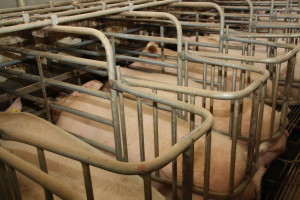Worldlog Settimana 23 – 2014
La settimana scorsa era quasi sicuro, ma adesso è definitivo: andiamo Bruxelles! Con il 4,2% dei voti, abbiamo vinto un seggio abbondante nel Parlamento europeo, dove Anja Hazekamp per i prossimi cinque anni andrà per combattere per gli interessi degli animali, la natura e l’ambiente. I nostri secondi in lista – noti opinionisti, attori e scrittori come Redmond O’Hanlon e Ingrid Newkirk – hanno ottenuto tanti voti di preferenza. Molto orgogliosi!
Siamo inoltre molto felici che la nostra partita sorella in Germania, la Tierschutz Partei, abbia ottenuto un seggio. Il primo luglio, tutti gli Eurodeputati presteranno giuramento e poi il vero lavoro inizierà. In bocca al lupo Anja!
Buone notizie anche dal parlamento. Il sottosegretario degli Affari economici ha emanato con effetto immediato un divieto provvisorio sull’uso di pesticidi metam-sodio. Metam-sodio è molto controverso a causa degli elevati rischi per l’uomo e per l’ambiente. Si tratta di un disinfettante chimico del suolo altamente tossico che è utilizzato, tra l’altro, nella produzione di gigli e fragole. Essa può danneggiare seriamente la salute dei residenti e dei passanti conferma un gruppo di esperti del Collegio Ammissione Pesticidi e Biocidi. Persone possono contrarre edema polmonare acuto e sviluppare sintomi respiratori cronici. Con il divieto provvisorio, il sottosegretario viene in parte incontro al nostro appello che richiedeva un’azione contro questo veleno pericoloso.
 La mia collega Esther Ouwehand ha protestato di recente frequentemente contro l’uso di metam-sodio
La mia collega Esther Ouwehand ha protestato di recente frequentemente contro l’uso di metam-sodio
Triste notizia dalla Danimarca. Tre danesi sono deceduti dopo essere stati infettati con l’antibiotico-resistenti MRSA batteri, proveniente da suini. Leggi qui tutta la storia. Ciò dimostra nuovamente la necessità di fermare il rinchiudere in massa degli animali, per prevenire lo scoppio di malattia animale con gravi conseguenze per l’uomo e gli animali.

Cani e gatti di razza hanno più problemi di salute rispetto ai cani “normali” e il gatto domestico, secondo una ricerca fatto dall’università di Utrecht. La ricerca è stata condotta dopo che avevo presentato una mozione al parlamento, chiedendo l’ampliamento e l’accelerazione della ricerca sui problemi di benessere nei cani di razza con disturbi ereditari.

Tra gli altri Labrador spesso soffrono di malattie di gomiti e fianchi di cani ibridi non di razza, secondo lo studio. Anche il Chihuahua e il Bulldog francese soffrono in giovane età più spesso di problemi delle articolazioni e gatti persiani hanno più spesso di normali gatti di casa anomalie dell’occhio, reni e della cute.
La ricerca mostra che i cani di razza e gatti soffrono molto di gravi difetti genetici. E’ assolutamente immorale selezionare solamente a base di aspetti esteriori senza prendere in considerazione il benessere degli animali. Dobbiamo porne fine il più presto possibile. I risultati dello studio saranno discussi a breve nel parlamento.
Alla prossima settimana!
It was already almost certain last week, but now it is definitive: we are going to Brussels! With 4.2 % of the votes, we have secured an ample seat in the European Parliament, where Anja Hazekamp will fight for the interests of animals, nature and the environment for the next five years. Our other popular candidates on the bottom of the party list – well-known opinion leaders, actors and authors, such as Redmond O’Hanlon and Ingrid Newkirk – have received a huge number of preferential votes. Very proud!
We are also very happy that our sister party in Germany, the Tierschutzpartei, has also secured a seat. On 1 July, all Euro MPs will be sworn in and the actual work will then begin. Best of luck, Anja!
There is also good news from the Lower House. The State Secretary of Economic Affairs has placed a temporary ban with immediate effect on the usage of the pesticide metam sodium. Metam sodium is extremely controversial because of its major risks to humans and the environment. It is a very poisonous soil disinfectant, which is used, among others, in the cultivation of lilies and strawberries. The substance can seriously harm the health of local residents and passers-by, as was confirmed by an expert panel of the College Admission Pesticides and Biocides. People may incur acute pulmonary oedema or develop chronic respiratory issues. With the temporary ban, the State Secretary partially meets our call to demand action against this dangerous poison.
 Recently, my colleague Esther Ouwehand repeatedly protested against the usage of metam sodium
Recently, my colleague Esther Ouwehand repeatedly protested against the usage of metam sodium
Sad news from Denmark. Three Danes died after they were infected by the antibiotics-resistant MRSA bacteria, which come from swines. Read the whole story here. This again shows the necessity of stopping to lock up animals in bulk, to prevent animal disease outbreaks with serious consequences for humans and animals.

Research conducted by Utrecht University has shown that pedigree dogs and cats have more health issues than ‘ordinary’ dogs and cats. The investigation was conducted after I tabled a motion in the House, calling for broader and swifter research into welfare issues in pedigree dogs with hereditary conditions.

The research has shown that Labradors, among other breeds, suffer from elbow and hip issues more often than crossings of non-pedigree dogs. Also, Chihuahuas and French Bulldogs suffer more from joint problems at a young age, and Persian cats have more abnormalities of the eyes, kidneys and skin compared to ordinary cats.
The research has proven that pedigree dogs and cats suffer severely from genetic defects. It is downright unethical to select purely on the basis of looks without taking into account the animals’ welfare. We must end this as soon as possible. The research results will be discussed in the Lower House soon.
Until next week!